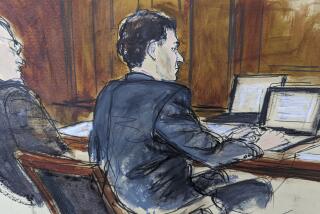Jurors Told How Enron Met Targets
- Share via
HOUSTON — A second Enron Corp. executive testified Tuesday that the company illegally dipped into reserves to meet and beat earnings targets under pressure from then-Chief Executive Jeffrey K. Skilling.
“It was standard operating procedure,” said David Delainey, former chief executive of Enron’s profitable wholesale trading franchise, during the fraud and conspiracy trial of Skilling and Enron founder Kenneth L. Lay. “At Enron in Houston, we tended to be pretty fast and loose with our rules.”
Delainey, under questioning by prosecutor Kathryn Ruemmler, said he met with Skilling in the second half of 2000 to discuss how his business unit, Enron North America, had easily met and exceeded its earnings targets, primarily by cashing in on the volatility of energy markets and through deals with California utilities.
“I said we had a couple of quarters in our pockets that would give us flexibility in the future,” he said. “I wanted to make sure he was aware we were doing really well.”
Skilling was so pleased he gave Delainey a hug, he said.
Delainey pleaded guilty in October 2003 to insider trading and admitted he participated in schemes to manipulate earnings to please Wall Street.
His testimony contradicted Lay and Skilling’s oft-repeated public message that Enron was a stable company with predictable growth rather than a trading company that was vulnerable to market volatility.
Prosecutors contend the two top executives pressed that message to maintain Wall Street’s bullish view of Enron’s stock, which could be diminished if analysts viewed the company as risky.
Allegations against Skilling also include that he minimized Enron’s profit from California trading in statements to analysts.
Delainey’s testimony about California trading profit piggybacked that of a former top Enron trader who said Tuesday that the company pocketed almost $1 billion in profit over nine months from wild energy trading during California’s power crisis.
Timothy Belden, who ran Enron’s Western power trading desk in 2000 and 2001 and pleaded guilty in October 2002 to conspiracy for manipulating the state’s market, told jurors that California’s “dysfunctional” market in the aftermath of electricity deregulation left it ripe for high prices, which spelled mass profit for Enron.
“The chaos drove high prices and the high prices drove our profits,” Belden said.
Belden’s guilty plea was the first public acknowledgment of criminal activity related to California’s power crisis.
Belden led traders who openly discussed manipulating California’s power market during profanity-laced telephone conversations in which they gloated about gaming California’s markets, according to audiotapes and transcripts of the calls released in 2004.
However, U.S. District Judge Sim Lake ruled in early January that prosecutors could not introduce the at-times salacious tapes because Skilling and Lay weren’t charged with manipulating California’s power market.
Skilling faces 31 counts of fraud, conspiracy, insider trading and lying to auditors, while Lay faces seven counts of fraud and conspiracy.
More to Read
Inside the business of entertainment
The Wide Shot brings you news, analysis and insights on everything from streaming wars to production — and what it all means for the future.
You may occasionally receive promotional content from the Los Angeles Times.










